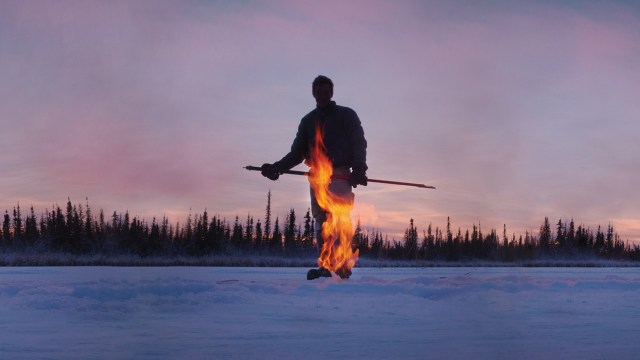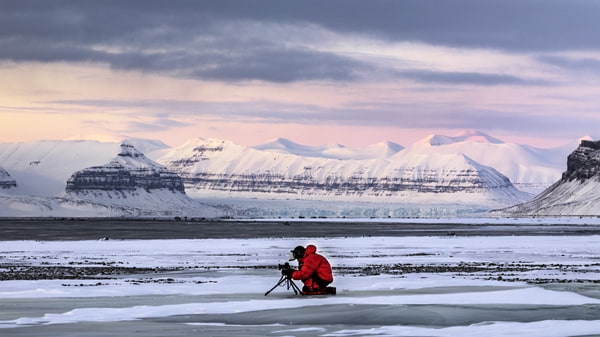
It begins by decrying “the largest science experiment in history,” our 250 years of burning coal and oil in such quantities that we’ve warmed the atmosphere and the oceans, altering the climate of our fragile planet — perhaps, fatally.
But don’t let that, the grim opening chapters of the grimly-titled documentary “Ice on Fire” scare you off. This HBO documentary, narrated by actor/environmentalist Leonardo DeCaprio, ends with a long summary of assorted other science experiments.
A Croatian scientist working in America is has been testing seeding the oceans with tiny iron particles to help duplicate a natural process, “marine snow,” a de-tox for the seas that makes the ocean less acidic by being a magnet for carbon, microbial life and everything associated with it.
There’s the Harvard researcher who helped invent “the artificial leaf,” for use in CO2 sequestration, a form of artificial photosynthesis for taking carbon out of the atmosphere.
A kelp farmer in the Thimble Islands of Connecticut swells with pride that he’s moved from simple fishing to growing and harvesting a replacement lifestock feed, kelp, that heals the ocean as it grows and is now “part of the army that’s going to save the planet.”
A forester with a non-profit that’s bought 2000 acres to manage young redwoods into old, carbon-sucking redwoods in California has a role. Iceland, which is losing glaciers and warming faster than the rest of us (the closer to the North Pole, the more pronounced Climate Change is), show off carbon capture machines (powered by Iceland’s natural thermal vents) that filter carbon out and bury it in the ground as others look at ways to use captured carbon to stimulate growth in greenhouses.
It’s not that Leila Conners’ film isn’t filled with dire warnings, and more than a few shots at environmental villains, from Ronald Reagan (Who only set back America’s solar energy revolution when he removed solar panels from the White House. The world ignored him.) to disgraced EPA fraud Scott Pruitt, who relaxed regulation on the already lax natural gas industry, adding to the world’s methane woes with leaky wells.
“Ice on Fire” is a globe-trotting state-of-climate-change update that starts with a history of when this research began — the 1950s — to the 2015 Paris Accords, which are on hold in the U.S., thanks to Trumpism. The film circles the globe with quick visits to air monitors in Colorado, “biomimicry” experts in Costa Rica, Norway and Britain, Africa and California, showing us some of the consequences of climate change and the diligent scientists documenting it thoroughly and raising the alarm.
Scores of such scientists are given a voice here, in between newspaper and magazine headlines, a rising chorus that is finally drowning out the denials of those “people who are literally profiting off the death of life on Earth,” as one expert declares.
“Some climate denial…rises to the level of a crime against humanity that probably should be prosecuted in The Hague.”
But “Ice on Fire” isn’t about reprisals and punishment for the Koch Brothers and their hirelings. It’s about a race to get the planet on a course to “return the climate to what it was 200 years ago,” just before the Industrial Revolution.
As narrator DiCaprio reminds us, speaking over scenes of the rapidly disappearing Arctic ice sheet, our bad decisions and climate destiny “need not be set in stone.”
Although the film has little that one could call exciting — the emphasis is on sober presentations of research and those doing it, because as DiCaprio narrates, “It’s their time to be heard — there’s an inherent call to arms in this engrossing HBO doc.
If we do turn our eyes away from Twitter and focus on doing this, what the world accomplishes will top the moon landings as “an unprecedented achievement in human history.”

As grim as seeing wildlife dying of thirst, starving polar bears and mass die-offs of whales and the like, the third act of “Ice on Fire” is bluntly can-do and upbeat.
More than one scientist unknowingly echoes the intro to TV’s “The Six Million Dollar Man.” “We have the technology” to fix this. “We don’t need to invent anything” to make it happen.
We just have to tune out and vote out liars who deliver whoppers about “Clean coal” and “Clean natural gas” and “Clean diesel.”

MPAA Rating: unrated
Cast: Narrated by Leonardo DiCaprio
Credits: Directed by Leila Conners. An HBO Films release.
Running time: 1:28
